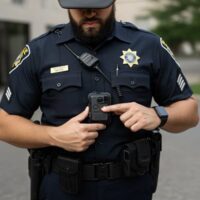Are Body Cameras Making A Difference In Misconduct?

In recent years, body-worn cameras (BWCs) have become a standard tool for law enforcement agencies across the country, including in Maryland. These devices were introduced with the goal of increasing transparency, holding officers accountable, and reducing instances of police misconduct. But have they actually made a difference?
While body cameras have provided valuable evidence in cases of police misconduct, they have not eliminated the issue. Victims still face challenges in proving their claims and seeking justice. Talk to a Baltimore criminal lawyer to learn more.
Benefits of Body Cameras?
Police misconduct refers to improper or illegal actions taken by law enforcement officers in the course of their duties. This can include excessive force, racial profiling, false arrests, or fabrication of evidence. Victims of police misconduct may suffer physical harm, emotional distress, and violations of their constitutional rights.
While the problem of law enforcement misconduct still exists, there are a couple of ways body cameras are making a difference.
- Increased transparency and accountability. Body cameras can provide objective evidence in disputes over police conduct. In Baltimore, where police misconduct has been a long-standing issue, body camera footage has been used in both criminal defense cases and civil rights lawsuits to support victims’ claims. When officers know they are being recorded, they may be more likely to follow proper procedures.
- Exposing misconduct and abuse. There have been several high-profile cases where body camera footage has played a critical role in proving misconduct. In some cases, video evidence has contradicted police reports, revealing unjustified uses of force or violations of citizens’ rights. This footage can be used to hold officers accountable, leading to internal discipline, firings, or even criminal charges against officers.
Despite their benefits, body cameras are not a perfect solution. Issues include selective activation, when officers may turn off cameras before an incident or fail to record critical moments, and footage control, such as law enforcement agencies control access to recordings, which may delay or limit public release.
While body cameras provide more evidence, studies show they have not dramatically reduced the use of force or misconduct complaints in many jurisdictions. If you believe you have been a victim of police misconduct in Maryland and want to learn more about evidence collection, connect with a legal professional.
Requesting Body Camera Footage
As soon as you connect with a Baltimore criminal lawyer, they will begin gathering important forms of documentation. For example, your attorney can file a public records request to obtain the video evidence. With strong evidence in place, lawyers can guide you through the process of filing a civil rights lawsuit and holding officers accountable.
Were you out and about in Baltimore when you experienced unlawful police actions? Speaking with a seasoned criminal attorney can help protect your rights and pursue the justice you deserve. Bring the badge numbers and other pieces of documentation you have to the attention of the legal team at Iamele & Iamele, LLP. Then, a path forward can be determined. Contact us to book your confidential appointment.

